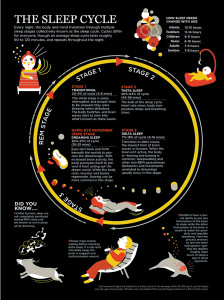Sleep cycles differ for everyone, though an average sleep cycle lasts roughly 90 to 120 minutes, and repeats throughout the night. To learn more, read the feature story “The Mystique of Sleep.”
Stage 1
Transitional
2%-9% of cycle (2-8 mins)*
This initial stage is easily interrupted, and people tend to be unaware they were sleeping when disturbed. The body twitches, and brain waves start to slow into what’s known as theta waves.
Stage 2
Theta Sleep
50%-64% of cycle (45-58 mins)
The bulk of the sleep cycle. Heart rate slows, body temperature drops and breathing slows.
Did you know? Time to wake up! Power naps involve waking before reaching delta sleep. If a nap lasts into delta sleep, the brain is sluggish and confused upon arousal.
Stage 3
Delta Sleep
7%-18% of cycle (6-16 mins)
Transition to delta waves, the slowest form of brain waves in humans. While the brain isn’t active, the body is—tossing and turning is common; sleepwalking and other non-REM parasomnias (behaviors and movements unrelated to dreaming) usually occur in this stage.
Rapid Eye Movement (REM) Stage
Dreaming Sleep
20%-27% of cycle (18-25 mins)
Eyes dart back and forth beneath the eyelids to process the dreamscape. With increased brain activity, the body paralyzes itself to prevent it from acting out the dream world. While the body rests, muscles and bones regenerate. Snoring can be more common in this stage.
Did you know? Unlike humans, dogs are not completely paralyzed during REM sleep and are known to run in place while dreaming.
How Sleep Needs Change with Age:
Infants: 12-15 hours
Toddlers: 11-14 hours
Children: 9-11 hours
Teens: 8-10 hours
Adults: 7-9 hours
Seniors: 7-8 hours
Did you know? Dolphins have a special ability to put one hemisphere of the brain to sleep while the other hemisphere of the brain is aware to watch for predators and regulate breathing. Then the process reverses to rest the other hemisphere—getting the dolphin roughly eight hours of sleep a day in short segments.
*Cycle percentages are based on a sleep cycle of an average male 30-39 years; percentages vary by age and gender. Minutes are calculated from percentages based on a 90-minute sleep cycle.

